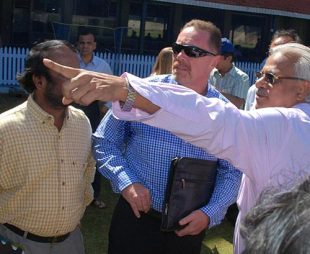And what of Pakistan?
England's decision to return to India highlights the double standards most countries exhibit when dealing with security issues
10-Dec-2008
|
|

|
"The show must go on" has been the refrain, and now it will. England's decision to return to India and get on with cricket, life and everything else is, on balance, difficult to argue against. Less difficult to argue against also is that the decision vividly illuminates the double standards of almost the entire cricket fraternity in dealing with India's neighbour Pakistan: that nobody much cares about touring Pakistan has rarely been more apparent.
All kinds of noble sentiments accompanied the break in England's tour following the Mumbai attacks. Terrorists must not be allowed to win. Cricket will galvanise Indians. Some said, f***k terrorists. Great, correct and emphatic noises they were, for who doesn't want terrorists to get f***ked?
But these sounds were mostly absent and generally less forceful through the last year, as Pakistan strove to make someone, anyone, come and play. No Test cricket for a year, and less prospect of it ahead, and no Champions Trophy. The message was unmistakable: Terrorism must not win the day, unless the day happens to be in Pakistan. Here they can keep winning until this blighted country is taken over by them, by men it is not even entirely responsible for creating; here, whose people clearly need no cricket to cheer them up, offering the pretence of life going on as normal.
The reasons are both clear and fuzzy. For one, the minds that were so closed against coming to Pakistan are easier prised open by the prospect of money. Noble intentions aside, does there remain any doubt now that the IPL will welcome Kevin Pietersen, Andrew Flintoff, and possibly a few more, with arms, hearts and pockets wide open? Not that it was needed, but England's return has emphasised that cricket currently begins and ends, and breathes and earns in between, in India.
It says much about cricket's current money-lust that it has taken the horrors of Mumbai, an attack at the very financial heart of a country and an entire sport, for people to wake up to the problem. Only the prospect of India being unable to bring untold fortunes into players' pockets has prompted men such as Tim May, head of the global players' union, to talk of solutions, talk conspicuously absent as Pakistan suffered.
Pakistan can rightly feel aggrieved and unwanted. That sense will not be lessened by the realisation that the security situation in both countries is different enough to perhaps warrant different responses. At least it is very much seen to be different: the Mumbai attacks rightly leave India a victim of terror, but suicide attacks in Pakistan leave it a victimless hub of terror. There is truth to the perception, though Pakistani victims are plentiful, and to deny the problem in Pakistan is blind and dangerous. But details are missed: that cricket hasn't been targeted and that attacks have mostly hit state and military targets. Ultimately it hardly matters, for a bomb in India will do the same as a bomb in Pakistan.
| Much of Pakistan's hopes of returning to the fold depend on the ICC, an organisation traditionally possessed of the backbone of a jellyfish, the moral substance of a loan shark, and a collective nous less than that of the three stooges | |||
But some hope can be drawn from England's decision. A precedent has been set, one Pakistan will use next time they are hosts: "If you came to India, why not to Pakistan?" Sadly for Pakistan, much of the basis for that hope rests on the ICC, an organisation traditionally possessed of the backbone of a jellyfish, the moral substance of a loan shark, and a collective nous less than that of the three stooges.
Terrorism is not going anywhere soon. Similar situations are likely to arise again. Some teams feel comfortable touring other countries where there has been an attack, others don't. Australia staying on in England during the 7/7 attacks, South Africa leaving Sri Lanka a year later after a blast (and India staying on), Australia not coming to Pakistan two months before an incident-free Asia Cup, Australian and South African players staying on at the IPL after the Jaipur blasts, England not wanting to travel to Pakistan for the Champions Trophy but returning to India. Even if in some cases the hypocrisy has been blatant, it stands to some reason that different countries provide different levels - or perceptions - of threat to other sides.
Often different parties view the same situation differently. One of the issues that particularly grated with Pakistan over the postponement of the Champions Trophy was that the report of the ICC-hired security firm was overlooked in favour of Reg Dickason's report, compiled for Australia, New Zealand and England. Both, it is said, held contrasting views, but it was Dickason's negative assessment in the end that held sway.
The only rational way of avoiding this discrepancy, to eliminate as much doubt, is for the ICC to appoint one security firm approved by all its members, which would make all future security assessments. To ensure that the method of assessing risk is standard, or less ad-hoc than it is now, won't stop tour cancellations. But it might erode suspicions of double standards, heal some of cricket's rifts, and leave affected members with little scope for complaint. In this strange, shapeless war, that will be a little battle won.
Osman Samiuddin is Pakistan editor of Cricinfo